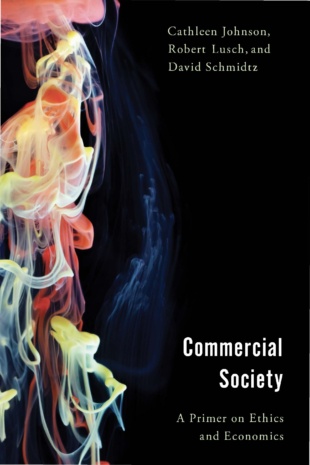One of the greatest and most joyful challenges of adult life is to develop skills that make the people around us better off with us than without us. Integrity is a key part of that challenge. We are social animals, aiming not simply to trade but to make a place for ourselves in a community. You don’t want to have to pretend that you feel proud of fooling your customers into believing you could be trusted.
The ethical question is: how do people have to live in order to make the world a better place with them than without them?
The economic question is: what kind of society makes people willing and able to use their talents in a way that is good for them and for the people around them?
The entrepreneurial question is: what does it take to show up in the marketplace with something that can take your community to a different level?
In this book, the authors discuss the connections between the ethical, economic, and entrepreneurial dimensions of a life well-lived.
The Authors
Cathleen Johnson
Cathleen Johnson earned her Ph.D in Economics from Virginia Tech in 2000, worked for Kollmorgan (on the prototype for what is now known as the Segway), did a post-doctoral fellowship with Nobel Laureate Vernon Smith in 2001, and contracted with the Canadian government through the non-profit Social Research Demonstration Corporation to do multi-million dollar experimental and field studies on attitudes toward risk. She also directed the experimental economics laboratory at CIRANO, a consortium of universities in Montreal. She worked as academic director for BASIS charter school system. At the University of Arizona, she has been Director of the Office for Economic Education. In the Economics Department, she taught Law & Economics, Microeconomics, Managerial Economics, Experimental Economics, and Basic Principles. She now teaches Experimental Economics in the Philosophy, Politics, Economics, and Law program, directs the Philosophy, Politics, and Economics Network, and serves on the Board of Directors of the Arizona Council for Economic Education.
Robert Lusch
Robert Lusch (1949-2017) served as Dean of the College of Business at Oklahoma and then Texas Christian, before coming to Arizona as Head of Marketing and Director of the McGuire Center for Entrepreneurship. He earned awards from the National Association of Accountants for contributions to accounting literature. The Academy of Marketing Science awarded him in 1997 its Distinguished Marketing Educator Award, and the American Marketing Association has twice (1997 and 2005) presented him the Harold Maynard Award for contributions to marketing theory. He received the AMA Louis Stern Award for contributions to the Marketing Channels’ literature (2002). The Marketing Management Association honored him with the Creative Career Contributions in Marketing award (2006). In 2009 the AMA awarded him its IOSIG Lifetime Achievement Award, and in 2010 he was the recipient of the AMA/Sheth Foundation Award for long-standing contributions to marketing literature. In February 2013 Lusch was presented the AMA/Irwin/McGraw-Hill Distinguished Marketing Educator Award.
David Schmidtz
David Schmidtz is Kendrick Professor of Philosophy (College of Social and Behavioral Sciences). He also is Eller Chair of Service-Dominant Logic (College of Management). In his field, the U of Arizona is peer-ranked as the #1 graduate program in the world. Arizona is the only school listed in Group 1. (The schools listed in Group 2 are Brown, Harvard, LSE, NYU, Oxford, Princeton, Toronto, Michigan, and Virginia.). He is author of Rational Choice and Moral Agency (Princeton Press, 1995), co-author with Bob Goodin of Social Welfare and Individual Responsibility (Cambridge, 1998), Elements of Justice (Cambridge Press, 2006), Person, Polis, Planet (Oxford Press, 2008), co-author with Jason Brennan of Brief History of Liberty (Blackwell, 2010), and co-author with Harry Brighouse of Debating Education (Oxford 2019). He also is editor-in-chief of Social Philosophy & Policy (Cambridge Press), which has the largest paid circulation among philosophy journals in the western world. As of 2019, his essays have been republished 98 times in textbooks and scholarly anthologies, and translated into 14 languages. His 17 doctoral students so far have all gone on to faculty positions and have themselves published many books with major presses.


